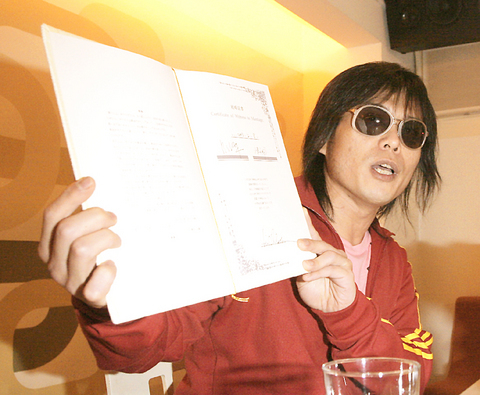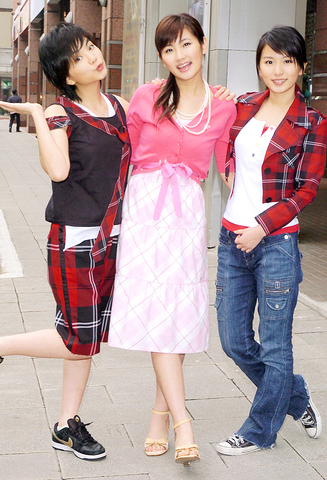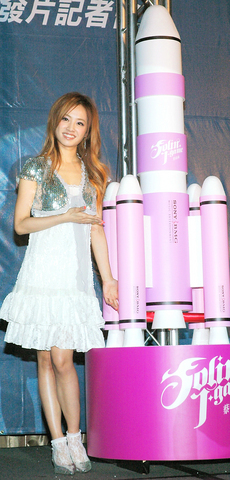This week's edition of TVBS Weekly broke some big news when it reported that Wu Bai (
The singer emerged to confirm their marriage, but corrected the report by announcing that the two actually tied the knot in Fukuoka, Japan, in 2003. The couple had kept their marriage a secret because, according to Wu Bai, "telling everyone wouldn't be fun." He denied, however, that the announcement was made because they were expecting a kid.
Last week the gossip rags in Taiwan and Hong Kong thought they'd struck gold when they released photos of Taiwanese pop diva Chang Hui-mei (A-Mei,

PHOTO: TAIPEI TIMES
Next Magazine (
Speaking of Tsai, she released a new album titled J-Game over the weekend. Ever since her emphatic split with Jay, when he was spotted in Japan with TV anchorwoman Patty Hou (
Finally, model fever in Taiwan has elicited a backlash, and leave it to bad boy rocker Chang Chen-yue (

PHOTO: TAIPEI TIMES
S.H.E. had a close brush with politics over the weekend, when a newspaper in Lanzhou, China, reported that the band had said that they weren't Chinese, but were Taiwanese. Not wanting to attract any part of the nationalist hysteria that's raged in China over the past several weekends, the girl band moved quickly to defuse the potential controversy by confirming that they had never been to Lanzhou and never been interviewed by any paper based there. They also noted in an open letter to the Great Daily News (

PHOTO: TAIPEI TIMES

As I finally slid into the warm embrace of the hot, clifftop pool, it was a serene moment of reflection. The sound of the river reflected off the cave walls, the white of our camping lights reflected off the dark, shimmering surface of the water, and I reflected on how fortunate I was to be here. After all, the beautiful walk through narrow canyons that had brought us here had been inaccessible for five years — and will be again soon. The day had started at the Huisun Forest Area (惠蓀林場), at the end of Nantou County Route 80, north and east

Specialty sandwiches loaded with the contents of an entire charcuterie board, overflowing with sauces, creams and all manner of creative add-ons, is perhaps one of the biggest global food trends of this year. From London to New York, lines form down the block for mortadella, burrata, pistachio and more stuffed between slices of fresh sourdough, rye or focaccia. To try the trend in Taipei, Munchies Mafia is for sure the spot — could this be the best sandwich in town? Carlos from Spain and Sergio from Mexico opened this spot just seven months ago. The two met working in the

Exceptions to the rule are sometimes revealing. For a brief few years, there was an emerging ideological split between the Democratic Progressive Party (DPP) and Chinese Nationalist Party (KMT) that appeared to be pushing the DPP in a direction that would be considered more liberal, and the KMT more conservative. In the previous column, “The KMT-DPP’s bureaucrat-led developmental state” (Dec. 11, page 12), we examined how Taiwan’s democratic system developed, and how both the two main parties largely accepted a similar consensus on how Taiwan should be run domestically and did not split along the left-right lines more familiar in

A six-episode, behind-the-scenes Disney+ docuseries about Taylor Swift’s Eras Tour and Rian Johnson’s third Knives Out movie, Wake Up Dead Man, are some of the new television, films, music and games headed to a device near you. Also among the streaming offerings worth your time this week: Chip and Joanna Gaines take on a big job revamping a small home in the mountains of Colorado, video gamers can skateboard through hell in Sam Eng’s Skate Story and Rob Reiner gets the band back together for Spinal Tap II: The End Continues. MOVIES ■ Rian Johnson’s third Knives Out movie, Wake Up Dead Man